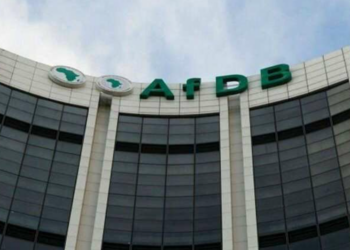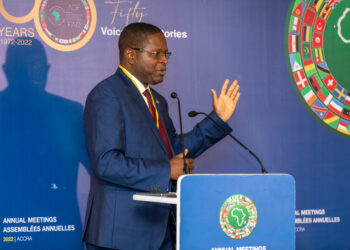The African economy slowed to 3.8% in 2022, placing the continent’s nominal GDP at an estimated $2.75 trillion.
Also, the Sub-Saharan region recorded a slow growth rate of 3.6%, in contrast to 4.1% recorded in 2021, with a projected growth rate of 3.1% in 2023, according to the World Bank.
The decline was attributed to sluggish global economic growth, high inflationary pressure, and tough financial conditions exacerbated by the high debt profile among African countries.
In terms of GDP per capita, which is a more accurate measure of productivity in an economy, the continent recorded an average of $2,705 in 2022, indicating a 6.6% increase compared to $2,538 recorded in the previous year.
GDP per capita serves as a pivotal economic gauge, offering valuable insights into the prosperity and living conditions of a nation’s populace.
Within Africa, a continent marked by diversity and dynamism, GDP per capita emerges as an indispensable instrument for evaluating economic progress, pinpointing inequalities, and shaping precision-focused policies.
GDP per capita is calculated as Gross Domestic Product divided by population size. It shows the average output per individual in the country.
This article presents the top 10 countries in Africa based on GDP per capita in 2022.
#5 Equatorial Guinea – $7,053
Equatorial Guinea recorded a GDP per capita of $7,053 in 2022, a 6% decline compared to $7,507 recorded in the previous year. The Central African country boasts of the 5th highest GDP per capita in the review year.
- The country’s real GDP grew 3.1% in 2022, after contracting 0.9% in 2021, driven by the non-oil sector. Meanwhile, the budget surplus expanded to 4.8% of the GDP during 2022, marking a significant increase from the 2.6% recorded in 2021.
- Public debt experienced a notable decline, dropping from 42.8% of the GDP in 2021 to 27.1% by the end of 2022. Inflation saw a shift, with an estimated rate of 5% throughout 2022, a noteworthy contrast to the 1.3% deflation experienced in the preceding year, attributed to elevated food costs driven by Russia’s incursion into Ukraine.
#4: Botswana – $7,738
Elevating its standing among nations with the most robust GDP per capita figures in Africa, Botswana ascended to the esteemed fourth position, boasting an average GDP per capita of $7,738.
- This noteworthy achievement signifies a growth of 6.9%, surpassing the preceding year’s recorded figure of $7,239.
- A testament to its economic vitality, Botswana’s nominal GDP registered a remarkable uptick of 8.6%, surging from $18.74 billion in 2021 to an impressive $20.35 billion in the year under review.
- This growth narrative is a manifestation of strategic planning, investment, and a dynamic economic ecosystem that embraces diversification and innovation.
#3: Gabon – $8,820
Gabon recorded 2.1% increase in its GDP per capita to $8,820 in 2022 compared to $8,636 recorded in the prior year, maintaining its third position.
- In 2022, there was a notable expansion in real GDP, with growth reaching 3.0%, a substantial increase compared to the 1.5% observed in the preceding year, primarily driven by the robust performance of both the oil sector, which achieved a growth rate of 7.1%, and the non-oil sector, with a growth rate of 2.3%.
- In response to inflationary forces and with the aim of bolstering foreign reserves, the Bank of Central African States implemented a series of rate hikes throughout 2022, signalling a deliberate move towards tighter monetary policy.
#2: Mauritius – $10,216
In 2022, Mauritius sustained its hold on the second position by achieving a notable 12.7% upswing in its GDP per capita, which climbed to $10,216 from the preceding year’s figure of $9,062.
- This robust growth in economic output per person underlines the country’s ongoing commitment to enhancing its citizens’ living standards and solidifies its status as a standout performer in the region’s economic landscape.
- A remarkable surge in real GDP growth was recorded in 2022, with estimates indicating a robust expansion of 8.7%. This substantial upturn marks a significant departure from the comparatively modest 3.4% growth recorded in the previous year, and it owes its momentum to a combination of factors.
- Sustained policy support played a pivotal role in propelling this economic acceleration, creating an environment conducive to growth. Additionally, the lifting of travel restrictions acted as a catalyst, fostering increased economic activity and contributing to the positive trajectory.
#1: Seychelles – $15,875
Securing its position at the pinnacle, Seychelles continued to lead the pack with an impressive GDP per capita standing at $15,875, signifying a remarkable ascent of 22.5% from the preceding year’s evaluation of $12,963.
- Nestled in the expanse of the Indian Ocean, Seychelles occupies a strategic location, situated between 480 and 1,600 kilometres off the eastern coast of Africa.
- Despite its modest land area and breathtaking island vistas, Seychelles boasts a distinctive socioeconomic landscape that propels it to the forefront of per capita economic performance.
- Seychelles recorded a 23.4% growth rate in its nominal GDP, standing at $1.59 billion against $1.29 billion recorded in the previous year.
Others making up the top 10
- #6: South Africa – $6,776
- #7: Libya – $6,716
- #8: Namibia – $4,911
- #9: Egypt – $4,295
- #10: Algeria – $4,274
Nigeria moved by one spot to the 18th position
- Despite its status as the largest economy on the African continent, boasting an estimated GDP of $477.4 billion in 2022, Nigeria found itself positioned at the 18th spot on the continental ranking of countries by GDP per capita from the 19th in the previous year.
- This intriguing juxtaposition unveils a multifaceted economic landscape, where sizeable GDP figures coexist with a distinct ranking in terms of per-person economic output.
- According to data provided by the World Bank, Nigeria experienced a 5.7% increase in its GDP per capita, which rose to $2,184 in 2022, from the $2,066 reported in the preceding year.
- In terms of nominal GDP, Nigeria’s economic performance demonstrated remarkable resilience, registering an 8.3% nominal year-over-year expansion in 2022, despite doldrums affecting the global and regional economy.
- The economic scale burgeoned from $440.8 billion in the previous year to $477.4 billion in the review year.
In essence, Nigeria’s economic narrative is one of complexity and nuance.
While its position as a continental economic powerhouse is evident, the interplay between its GDP magnitude, per capita dynamics, and population size adds depth to the understanding of its economic story.
























